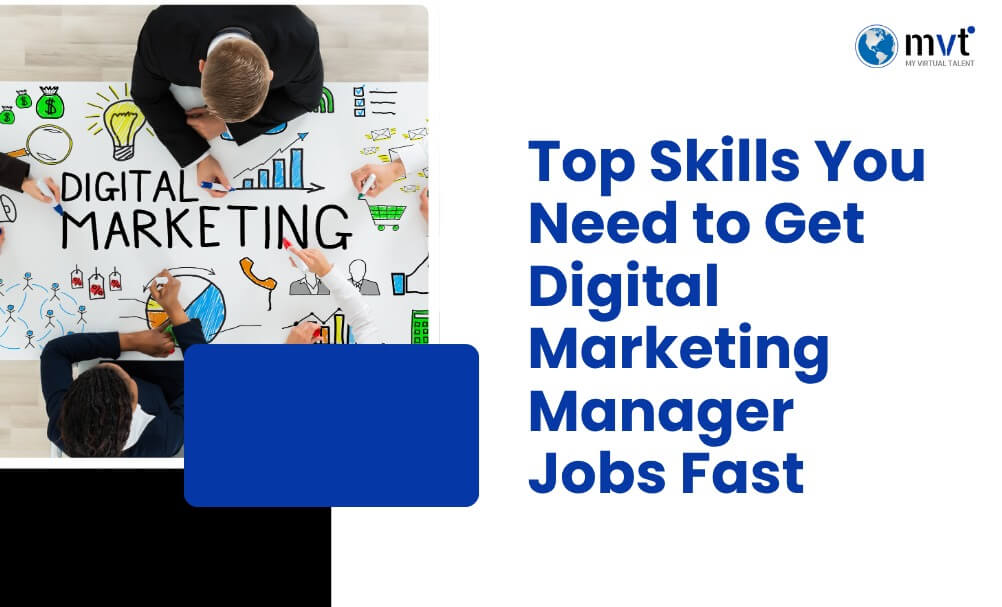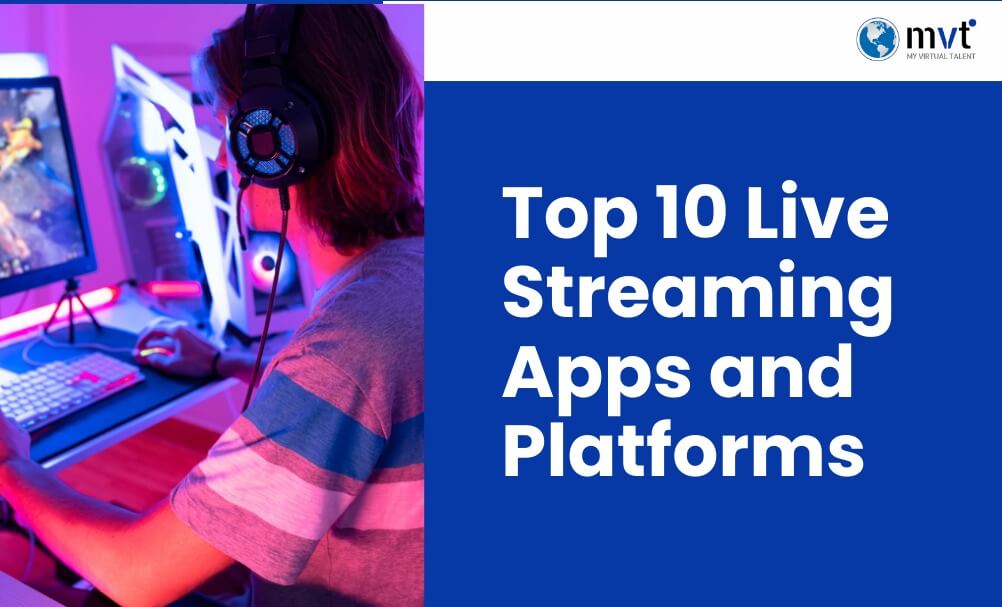
The demand for skilled digital marketing professionals has never been higher. According to the U.S. Bureau of Labor Statistics, advertising, promotions, and marketing manager roles are expected to grow by 7% from 2022 to 2032 faster than most other careers. This growth means around 31,000 new opportunities every year, making now the perfect time to explore digital marketing manager jobs.
But with high opportunity comes strong competition. Companies are searching for professionals who combine technical knowledge with strategic thinking. They want leaders who can manage complex campaigns, understand analytics, and deliver real business growth.
This guide will help you develop the essential skills to stand out from other candidates. You’ll learn about key technical tools, leadership traits, and the best ways to highlight your strengths. Whether you’re entering the field or advancing your career, these insights will help you confidently pursue and land your ideal digital marketing manager job.
What Does a Digital Marketing Manager Actually Do?
A digital marketing manager acts as both the planner and the doer behind a company’s online growth. This professional designs smart marketing strategies, leads teams, and ensures that every campaign aligns with business goals.
Their job blends creativity and analytics. On the planning side, they build long-term marketing strategies, manage budgets, and define performance goals (KPIs) to measure success. They also study market trends, competitors, and customer behavior to find the best opportunities for growth.
In daily work, they manage websites, social media, search engine campaigns, and email marketing programs making sure every channel works together to guide customers smoothly from interest to purchase.
Strong leadership is key. Successful managers guide creative teams, encourage collaboration, and communicate marketing performance clearly to company leaders.
The best digital marketing manager jobs go to professionals who mix creative ideas with data-driven decision-making, turning insights into results that help businesses grow.
Must-Have Hard Skills for Digital Marketing Manager Jobs
SEO and SEM Expertise
Search visibility is one of the most important parts of digital marketing success. Businesses need professionals who understand both SEO (Search Engine Optimization) and SEM (Search Engine Marketing) to increase online visibility and bring in high-quality website traffic.
A skilled digital marketing manager knows how to perform detailed keyword research using tools like Google Keyword Planner, SEMrush, or Ahrefs. They must be familiar with on-page SEO methods such as optimizing titles, meta tags, headers, and internal links. Technical SEO is also key; it includes improving site speed, ensuring mobile responsiveness, and adding proper schema markup.
Strong off-page SEO includes building quality backlinks, managing local SEO, and using social signals to improve search rankings.
For SEM, managers create and optimize PPC (Pay-Per-Click) ads on platforms like Google Ads and Microsoft Advertising. They manage bids, test ad copies, improve landing pages, and track conversions to ensure every campaign delivers measurable results.
In today’s market, mastering these skills helps professionals stand out in digital marketing manager jobs.
Data Analysis and Reporting
Modern marketing success depends on making smart, data-based decisions, not guesses. Professionals in digital marketing manager jobs must know how to gather, understand, and use data from many sources to guide their strategies.
Knowing Google Analytics, especially GA4, is essential. A great manager can track conversions, build custom segments, and create reports that explain how campaigns perform. They understand audience behavior, attribution models, and e-commerce tracking helping them make informed decisions about where to invest marketing resources.
Advanced managers also use tools like Google Data Studio, Tableau, or Power BI to build dashboards that show clear performance insights. These visuals make it easy for company leaders to see trends and opportunities.
The most important skill is turning data into action. Instead of just noting a traffic drop, top managers find the cause, like mobile issues or changing seasons, and recommend data-backed solutions to improve results.
Content Marketing and Strategy
Content plays a central role in digital marketing manager jobs, serving as the foundation for nearly every online channel. A strong content strategy helps guide potential customers from awareness to conversion while supporting long-term brand growth.
Effective managers plan content strategically. They build editorial calendars that match business goals, product launches, and seasonal campaigns. They understand how different formats like blogs, videos, podcasts, infographics, and social media posts work together to attract and engage audiences.
Optimization is equally important. Managers apply SEO basics, ensure readability, and adapt content for different platforms. They know how to repurpose materials, turning one in-depth blog post into short videos, email newsletters, or social updates.
Measuring content success goes beyond page views. Skilled managers track engagement, time on page, conversions, and how content contributes to revenue. By identifying high-performing themes, they refine future strategies for better marketing results.
Social Media Management
Social media is a vital part of digital marketing manager jobs, serving as both a brand awareness tool and a direct communication channel with customers. Managers must skillfully balance promotional posts with authentic community engagement to build trust and loyalty.
Each platform has its own strengths and audience behavior. LinkedIn focuses on professional networking, Instagram highlights visual storytelling, Twitter enables fast-paced conversations, and TikTok thrives on short, creative videos. Great managers tailor content style, tone, and strategy for each platform to connect effectively with diverse audiences.
Community management is just as important. Responding quickly to comments, handling complaints professionally, and encouraging positive conversations all help strengthen brand reputation.
Social media advertising is another key skill. Managers plan and run paid campaigns, optimize ad creatives, and track conversions. By using data-driven insights and platform-specific targeting options, they ensure every ad delivers meaningful results for the business.
Email Marketing and Automation
Email marketing continues to be one of the most powerful and the cost-effective tools in digital marketing manager jobs. It allows businesses to build strong relationships with customers through timely, personalized communication.
A skilled digital marketing manager knows how to use popular platforms like Mailchimp, HubSpot, Klaviyo, or Marketo to plan and execute email campaigns. They design responsive templates, segment subscriber lists, and set up automated workflows such as welcome emails, abandoned cart reminders, and re-engagement campaigns.
Personalization and automation are key. By analyzing customer data like past purchases or engagement levels managers can send targeted messages that feel personal and relevant.
They also rely on A/B testing to improve performance. Testing subject lines, content styles, and send times helps discover what works the best. Understanding how to interpret this data ensures every email campaign drives real business results, not just open rates.
The Soft Skills That Separate Good from Great
While technical capabilities open doors to interviews, soft skills ultimately determine job offers and career advancement. The most successful digital marketing managers combine technical expertise with exceptional leadership, communication, and strategic thinking abilities.
Leadership and Team Management
Strong leadership lies at the heart of successful digital marketing manager jobs. Managers must guide their teams with clarity, confidence, and empathy to achieve ambitious goals.
Effective leaders know how to delegate wisely assigning tasks based on each team member’s strengths while helping them develop new skills. They create structured project plans, set realistic deadlines, and offer continuous feedback to ensure everyone stays aligned and motivated.
Motivating a marketing team takes more than instructions; it requires inspiration. Great managers recognize achievements, celebrate milestones, and provide opportunities for professional growth through training, mentorship, or promotions.
Collaboration is equally vital. Managers work closely with sales, product, and creative departments to ensure unified strategies and consistent results.
As Seth Godin once said, “The best managers don’t just manage campaigns; they build and empower the marketers of tomorrow.” That mindset defines true leadership in modern digital marketing.
Strategic Thinking and Business Acumen
Digital marketing managers must connect tactical campaign activities to broader business objectives, requiring deep understanding of how marketing contributes to company growth and profitability.
Budget management skills involve allocating resources across channels based on expected returns, monitoring spend throughout campaign periods, and adjusting allocations based on performance data. Understanding cost-per-acquisition (CPA), customer lifetime value (CLV), and return on ad spend (ROAS) enables managers to make informed investment decisions.
Strategic forecasting involves projecting campaign outcomes based on historical performance data and market conditions. A strategic manager can justify increased advertising spend by presenting clear ROI projections and demonstrating how additional investment will drive proportional revenue growth.
Understanding profit and loss (P&L) statements helps managers evaluate marketing’s contribution to overall business health. This includes recognizing how customer acquisition costs impact profitability and identifying opportunities to improve marketing efficiency without sacrificing growth.
Communication and Collaboration
Strong communication sits at the core of all digital marketing manager jobs. Marketing managers act as bridges between creative teams, data analysts, senior leaders, and external partners, ensuring everyone stays aligned and informed.
Presentation skills are vital. Managers must explain campaign performance, pitch new ideas, and train team members on tools or strategies. Well-prepared, data-backed presentations inspire confidence among executives and help secure future budgets or approvals.
Collaboration across departments is another key responsibility. Managers work with sales to improve lead quality, support product teams during launches, and coordinate with customer service to handle customer inquiries effectively.
Equally important are writing skills. Whether crafting client proposals, internal updates, or marketing emails, managers must communicate clearly and persuasively. Adapting tone and style for each audience, while maintaining a consistent brand voice, ensures that every message supports the company’s overall marketing goals.
Adaptability and Problem-Solving
The world of digital marketing manager jobs changes faster than ever. New platform algorithms, privacy rules, and shifting customer habits constantly reshape how marketing works. Successful managers see these changes not as problems but as chances to grow and stand out.
Continuous learning is key. Great managers stay updated by reading marketing blogs, joining webinars, earning certifications, and testing new tools or platforms before competitors do. This habit helps them keep their strategies fresh and effective.
Problem-solving skills are equally important. When campaigns don’t perform well, strong managers dig deep to find the cause, fix it, and turn challenges into new opportunities.
Finally, crisis management matters. Whether facing bad reviews, website issues, or sudden changes in the market, effective managers stay calm, act quickly, and lead their teams to protect the brand’s reputation and success.
How to Showcase Your Skills and Land the Job
Technical skills and leadership capabilities mean nothing without effective presentation to potential employers. The most qualified candidates distinguish themselves through strategic self-marketing that demonstrates their expertise convincingly.
Build a Compelling Portfolio
Create a professional website or digital portfolio showcasing specific campaign results with detailed case studies. Include metrics like conversion rate improvements, cost reduction achievements, and revenue growth attributed to your marketing efforts. Visual elements such as before/after screenshots, campaign performance graphs, and creative assets help employers understand your capabilities quickly.
Document your problem-solving process by explaining campaign challenges, strategic decisions, implementation steps, and measurable outcomes. This storytelling approach demonstrates analytical thinking and results-oriented focus that employers value highly.
Earn Relevant Certifications
Validate your technical skills through industry-recognized certifications from Google, HubSpot, Facebook, and other major platforms. Google Analytics and Google Ads certifications are particularly valuable given their universal application across industries.
Display certifications prominently on your LinkedIn profile, resume, and portfolio website. These credentials provide credibility and demonstrate commitment to professional development in rapidly evolving fields.
Optimize Your Professional Presence
Craft a LinkedIn headline that specifically targets “digital marketing manager jobs” while highlighting your unique value proposition. Use the Featured section to showcase portfolio items, case studies, and professional achievements that differentiate you from other candidates.
Maintain an active professional presence by sharing industry insights, commenting thoughtfully on marketing content, and publishing articles that demonstrate your expertise. This content marketing approach positions you as a knowledgeable professional within your network.
Prepare for Interview Success
Research common interview questions specific to digital marketing manager roles and prepare detailed responses using the STAR method (Situation, Task, Action, Result). Practice explaining technical concepts in accessible language for non-marketing stakeholders.
Prepare specific examples of campaign failures and lessons learned, budget management experiences, team leadership challenges, and cross-departmental collaboration successes. Employers appreciate candidates who can discuss setbacks honestly while demonstrating growth mindset and resilience.
Ready to Launch Your Digital Marketing Career
Landing top digital marketing manager jobs requires more than just technical know-how; it takes leadership, strategy, and adaptability. Strong skills in SEO, data analysis, and marketing automation form the base for effective campaigns. At the same time, soft skills like clear communication, creative problem-solving, and strategic planning turn good managers into great leaders.
Since the marketing world keeps changing fast, continuous learning is essential. Algorithm updates, new technologies, and privacy shifts constantly reshape how digital campaigns work.
Start today by improving one key skill earn a Google Analytics certification, build a personal project, or refine your presentation skills. Small, consistent actions create big career progress.
Remember, successful managers blend creativity with data, leadership with collaboration, and innovation with results. Need help building a winning strategy or refining your resume? Consult MyVirtualTalent to take your marketing career to the next level.
Looking for fresh content?
Get articles and insights from our weekly newsletter.
Recent Posts
Reduce Your Marketing Spend By 70% And Grow Your Revenue Organically 10X Faster!
Get a Free Quote Today!










